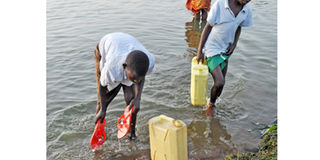Donors ask regional states to conserve Lake Victoria

Children draw water from Lake Victoria recently. PHOTO BY geoffrey sseruyange
What you need to know:
The donors at the conference that ended in Kampala yesterday say the five countries benefiting from the lake are not doing enough to save it from human activities.
Kampala
The third Lake Victoria Basin Donors’ Conference ended yesterday with the development partners calling upon riparian states to harmonise policies on the conservation of Lake Victoria.
The partners; Finland, Sweden, Germany, Japan, World Bank and the African Development Bank, noted that although the lake was at risk of human activities, there were no uniform interventions by all the five countries - Uganda, Kenya, Tanzania, Burundi and Rwanda - using the lake to save it.
In one of the recommendations, the development partners, who in the last financial year alone contributed about $40 million to the Lake Victoria Basin Commission Secretariat [LVBC], noted: “There is a general agreement that the East African member states propose projects to conserve the lake that are in tandem with the programmes of each of the members states.”
Way forward
In this way there shall be harmonisation of policies for the best practices towards the usage and utilisation of the lake. The LVBC is the joint authority tasked by the East African Community Secretariat to lead the conservation of Lake Victoria which has more than 40 million people settling around it but directly employs only 4 million, according to the surveys.
Dr Canisius Kanangire, the LVBC executive secretary, told this newspaper, that “the biggest challenge was to harmonise the policies engineered by all the member states.”
Although he was not committal to admit the lack of political commitment amongst the states, Dr Kanangire acknowledged that as long as LVBC has the support of the EAC secretariat, major headway would be achieved by 2016. “We have to go through such negotiations to ensure that policies in the Rwanda are similar with what Kenya has put in place,” he added.
The development partners, most of whom expressed concerns on the slow progress of the projects they fund, pledged continued financing but called for behavioural change by the respective governments.
Ms Magda Lovei, the World Bank Regional manager for social, environment and rural development, said, “they had taken a stand to withdraw from all the projects where they felt unconvinced by the results.”




